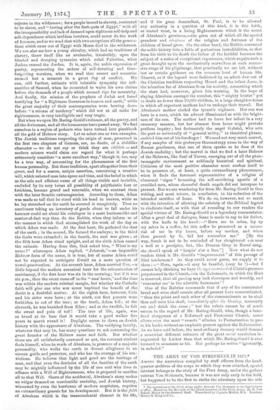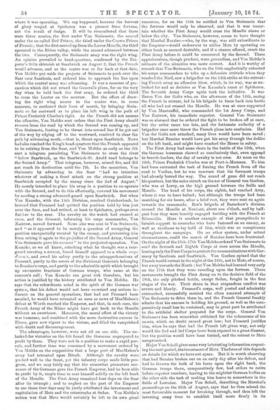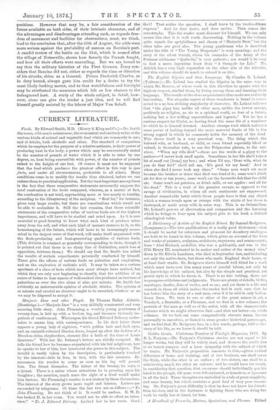THE ARMY OF VON STEINMETZ IN 1870.* AMONG the narratives
compiled by staff officers from the head- quarter archives of the corps to which they were attached, special interest belongs to the story of the First Army, under the gallant veteran Von Steinmetz, because it was not only early in the field, but happened to be the first to strike the adversary upon the side
• The Operations of the First Army under General Ton Steinmetz to the Capitulation of Metz. Based on the Records of the Head-Quarters of the First Army. By N. Von Schell, Major M the General Staff. Translated by Captain HollIst, RA. London : Henry S. King and Co. where it was operating. We say happened, because the harvest of glory reaped at Spicheren was a present from fortune, not the result of design. It will be remembered that there were three armies, the first under Von Steinmetz, the second under the so-called Red Prince, the third under the Crown Prince of Prussia; that the first moved up from the Lower Moselle, the third operated in the Rhine valley, while the second advanced between the two. Consequently, the Steinmetz army was the right wing. An opinion prevailed in head-quarters, confirmed by the Em- peror's little skirmish at Saarbriick on August 2, that the French would advance, and as the centre was so far back at that date, Von Moltke put aside the projects of Steinmetz to push over the Saar near Saarlouis, and ordered him to approach the line upon which the central army was advancing. It was a measure of pre- caution which did not retard the General's plans, for on the very day when he held back the first army, he ordered the third to cross the Lauter on the morrow. But the effect of draw- ing the right wing nearer to the centre was, in some measure, to confound their lines of march, by bringing Stein- metz so far eastward as to place his left wing in the path of Prince Frederick Charles's right. As the French did not assume the offensive, Von Moltke sent orders that the First Army should remove from the road by which the Second was coming up, and Von Steinmetz, fearing to be thrust into second line if he got out of the way by edging off to the westward, resolved to clear the path by advancing south,—that is, direct upon Saarbriick. News had also reached the King's head-quarters that the French appeared to be retiring from the Saar, and Von Moltke as early as the 5th sent a telegram permitting Von Steinmetz to cross the river "below Saerbriick, as the Saarbriick-St. Avold road belongs to the Second Army." That telegram, however, missed fire, and did not reach its destination until the 7th. In the meantime, Von Steinmetz by advancing to the Saar "bad no intention whatever of making a front attack on the strong position at Saarbnick occupied by the enemy since the 2nd of August." He merely intended to place his army in a position to co-operate whh the Second, and to do this effectually, covered his movement by sending a strong advanced-guard upon Saarbriick. But when Von Kameke, with the 14th Division, reached Guichenbach, he learned that Frossard had quitted the position held by him just over the Saar, and had retired, at least to Spicheren, perhaps even further to the rear. The cavalry on the watch had crossed at once, and the General, informing his corps commander, Von Zastrow, moved forward. News also was sent to Von Steinmetz, and "as it appeared to be merely a question of occupying the position unexpectedly vacated by the enemy, and preventing him from seizing it again to the prejudice of the Second Army, General Von Steinmetz gave his consent" to the projected operation.. Von Kameke, as we all know, attacking what he thought was a rear- guard covering a retreat, found himself opposed to a whole corps d'aroCe, and owed his safety partly to the misapprehensions of Frossard, partly to the errors of the divisional Generals belonging to Bazaine'e corps, and partly to the admirable spirit which brought up successive fractions of German troops, who came at the cannon's call ; Von Kameke ran great risk therefore, but his action is justified by the history attributed to Von Moltke. He says that the subordinate acted in the spirit of the German war system, that his defeat would not have exercised any serious in- fluence on the general operations, that had not Frossard been assailei, he would have retreated as soon as news of MacMahon's defeat at Worth reached the Emperor, and that, in such case, the French Army of the Rhine might have got back to the Moselle without an overthrow. Moreover, the moral effect of the victory was immense, and combined with the more destructive success in Elsass, gave new vigour to the victors, and filled the vanquished with doubt and discouragement.
The advantages, however, were not all on one side. The un- looked-for victories on the 6th found the Germane unprepared to profit by them. They were not in a position to make a rapid pur- suit, and further time was consumed by a movement ordered by Von Moltke on the supposition that a large part of MacNIahon's army had retreated upon Bitsch. Although the cavalry were pushed well to the front, yet the infantry corps made little pro- gress, and we may fairly say that the somewhat premature suc- cesses of the Germans gave the French Emperor, had be been able to profit by it, ample time to seat himself solidly on the left bank of the Moselle. The First Army remained four days on the Saar after its triumph ; and to neglect on the part of the Emperor to use those four days may be justly attributed the investment and capitulation of Metz and the catastrophe at Sedan. Von Moltke's notion was that Metz would certainly be left to its own great I resources, for on the 11th he notified to Von Steinmetz that the fortress would only be observed, and that it was uncer- tain whether the First Army would cross the Moselle above or below the city. Von Steinmetz, however, seems to have thought that Marshal Bizaine—who, by the way, was still subordinate to the Emperor—would endeavour to utilise Metz by operating on either bank as seemed desirable, and if a chance offered, crush the First Army before it could be succoured by the Second. These apprehensions, though prudent, were groundless, and Von Moltke's estimate of the situation was more correct. And it is worthy of remark that Von Steinmetz, who on the 10th emphatically exhorted his corps commanders to take up a defensive attitude when they reached-the Nied, saw a brigadier on the 14th strike at the retreat- ing French army an offensive blow, which, in its way, was as un- looked for and as decisive as Von Kameke's onset at Spicheren. The Seventh Army Corps again took the initiative. It was Baron Von der Goltz who, on the afternoon of the 14th, seeing the French in retreat, led in his brigade to force back into battle all who had not crossed the Moselle. He was at once supported by Von Manteuffel, who commanded the 1st Army Corps, and Von Zastrow, his immediate superior. General Von Steinmetz was so alarmed that he ordered the fight to be broken off at once, but the order came too late, and the fortunate audacity of a brigadier once more threw the French plans into confusion. Had Von der Goltz not attacked, many lives would have been saved ; but Marshal Bazaine would have got his army through the defiles on the left bank, and might have reached the Meuse in safety.
The First Army had some share in the battle of the 16th, when the German horsemen showed so conclusively that, even opposed to breech-loaders, the day of cavalry is not over. At noon on the 16th, Prince Frederick Charles was at Pont-h-Mousson. To him had been entrusted the task of forcing the French from off the road to Verdun, but he was unaware that his foremost troops had already barred the way. The sound of guns did not reach his quarters, but the noise struck on the ear of General von Goeben, who was at Lorry, on the high ground between the Seille and Moselle. The head of his corps, the eighth, had reached Arry, where it was to have halted ; but although the troops had been marching for six hours, after a brief rest, they were sent on again towards the cannonade. Rex's brigade of Barnekow's division crossed the Moselle at Novdsut, about one o'clock, and by half- past four they were heavily engaged battling with the French at Rezonville. Here is another example of that promptitude to furnish support to comrades who have fastened on an enemy, as well as readiness to lay hold of him, which was so conspicuous throughout the campaign. On no other system, under actual circumstances, could the march of Bazaine have been frustrated. On the night of the 16th-17th Von Moltke ordered Von Steinmetz to send the Seventh and Eighth Corps at once across the Mdselle, leaving only the First Corps to protect the communications with Ger-. many by Saarlouis and Saarbriick. Von Goeben opined that the French would retreat in the night of the 16th, not to Metz, of course, but away towards the North ; but Von Moltke had learned very early on the 17th that they were receding upon the fortress. These movements brought the First Army on to the decisive field of the 18th, the only pitched battle, except Sedan, fought in the first stages of the war. Their share in that stupendous conflict was severe and bloody. Frossard's corps, well posted and admirably entrenched, successfully resisted the often renewed attempts of Von Steinmetz to drive them in, and the French General frankly admits that his success in holding his ground, as well as the com- paratively small loss he sustained, may in great part be attributed to the artificial shelter prepared for the corps. General Von Steinmetz has been somewhat criticised for the vehemence of his onsets, which no doubt caused great loss; but Frossard justifies him, when he says that had the French left given way, not only would the 2nd and 3rd Corps have been exposed to a great disaster, but the position would have been turned, and the retreat to Metz compromised.
Major Von Schell gives some very interesting information respect- ing the next period, the investmentof Metz. The force of this depends. on details for which we have not space. But it is worth observing that had Bazaine broken out on an early day after his defeat, and had he thrown the bulk of his force upon the right bank, the German troops there, comparatively few, had orders to retire before superior numbers, leaving to the mightier German bodies on the other side the task of making him heave to somewhere in the fields of Lorraine. Major Von Schell, describing the Marshal's proceedings on the 26th of August, says that he then missed the most favourable moment for breaking through, and thus left the iuvesting army time to establish itself more firmly in its positions. However that may be, a fair consideration of the forces available on both sides, of their intrinsic character, and of the advantages and disadvantages attending each, as regards free- dom of movement and facilities for obstructions, must, we think, lead to the conclusion that, after the 26th of August, the odds were more serious against the probability of success on Bazaine's part. A candid review of the battle on the 81st, which is named after the village of Noisseville, shows how fiercely the French fought, and how all their efforts were unavailing. But we are bound to say that the military historian of the First German Army con- siders that Bazaine did not, either as regards the time or direction of his attacks, shine as a General. Prince Frederick Charles, as in duty bound, always gave him credit for a desire to try the most likely-looking moves, and to that watchfulness and foresight may be attributed the measures which left so few chances to the beleaguered host. A study of the whole subject, in detail, how- .ever, alone can give the reader a just idea, and be will find himself greatly misted by the labour of Major Von Schell.




































 Previous page
Previous page